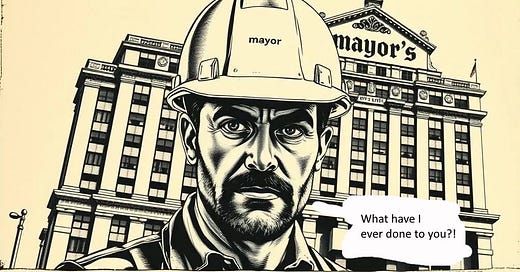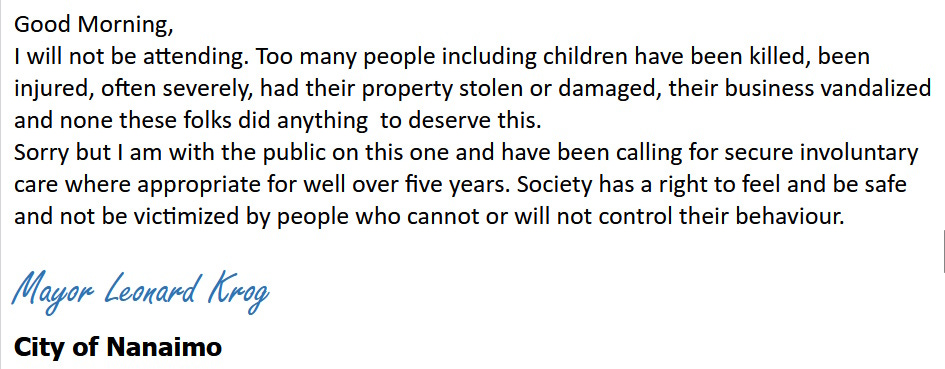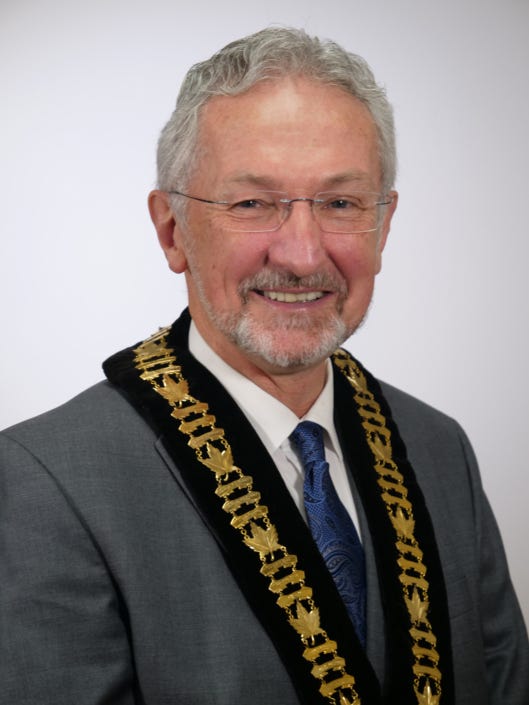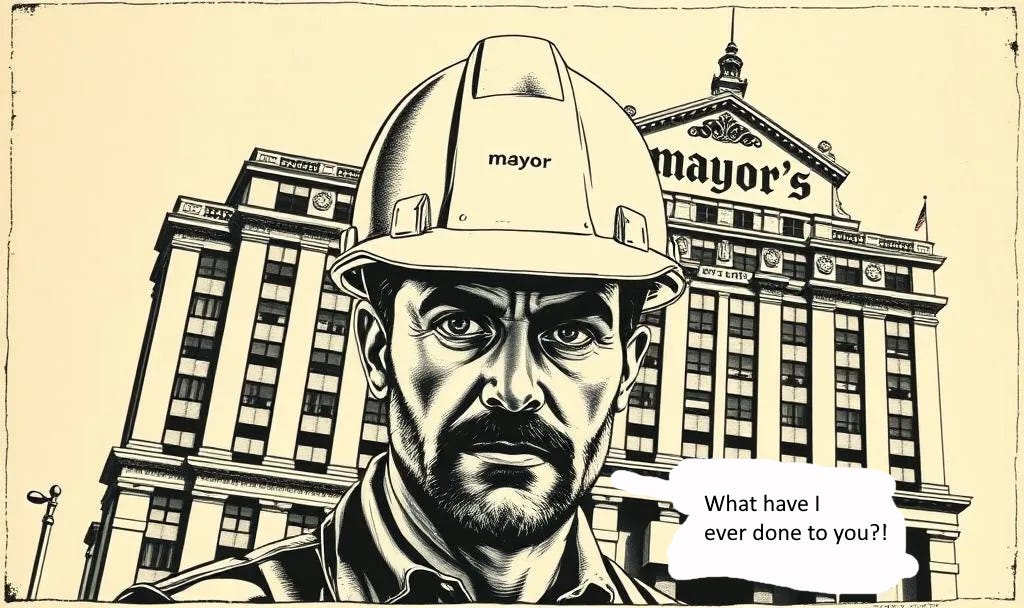The Mayor and the Unheard Victims of Civil Commitment
The views of a pro-force mayor exemplify widespread misunderstandings—and worsen homelessness
I recently gave a talk about Your Consent Is Not Required in a small city, far from any of the big urban centers that typically make it into national and international news reporting on involuntary psychiatric commitment. The experience displayed the diversity of people getting subjected to civil commitment—and highlighted the widespread, ill-informed attitudes that are preventing those people’s stories and views from emerging into mainstream public discussion and policy debates all around North America.
The event organizers in the west coast Canadian city of Nanaimo, British Columbia (BC) expressed concern to me that people vehemently supportive of expanding forced treatment might attend my talk and cause disruption. Nothing untoward ultimately happened; however, as soon as I arrived, I saw the main reason such vehemence was rising.
In many North American cities, the population of visibly homeless people has grown wherever housing prices have climbed, publicly subsidized and supportive housing have declined, and real wage rates, welfare, disability supports, and retirement pensions have stagnated. Southwestern BC suffers from all of those problems, and while Nanaimo’s population barely passes 100,000, some downtown blocks were as crowded with unhoused people as much larger cities. Indeed, a 2023 homelessness count found that Nanaimo’s rate of unhoused people relative to its population size was worse than Vancouver’s and comparable to California’s and New York’s.
Where does Nanaimo’s political leadership stand on these challenges?
Nanaimo Mayor Leonard Krog has long been a prominent proponent of expanding involuntary commitment, blaming homelessness in the 2020s on the closure of asylums in the 1960s. This, even though there’s no evidence of such a link. And, in fact, the numbers of residential psychiatric beds and rates of involuntary psychiatric detentions and forced outpatient treatment have been rising in his province for decades.
One of the organizers emailed an invitation about my talk to Krog and Nanaimo’s city council members. Krog emailed back right away, cc’ing everyone on council as well, so that no one could miss his declaration:
“I will not be attending. Too many people including children have been killed, been injured, often severely, had their property stolen or damaged, their business vandalized and none these folks [sic] did anything to deserve this. Sorry but I am with the public on this one and have been calling for secure involuntary care where appropriate for well over five years. Society has a right to feel and be safe and not be victimized by people who cannot or will not control their behaviour.”—Mayor Leonard Krog, City of Nanaimo.
It was a short email—yet line by line, phrase by phrase, it reflected so much about the current culturally dominant attitudes, and North America’s overall worsening political climate.
First, it’s absurd to twist logic and language so much as to characterize his own stream of invectives, prejudiced over-generalizations, and fever for aggressive policing as actually being a call for “appropriate” and compassionate “care.” But this kind of Orwellian doublethink – holding two contradictory ideas in one’s mind at the same time as if they logically fit together, such as WAR IS PEACE and AGGRESSIVE POLICING IS COMPASSIONATE CARE – has become central to pro-force messaging across our culture.
Like so many politicians, Krog also deliberately or unwittingly mixed up the forensic psychiatric commitment system – for people labeled with mental disorders who commit criminal offenses and serious violence – with the subject of my talk and book, the civil psychiatric commitment system for ordinary, generally non-violent citizens like anxious children, depressed workers, post-partum mothers, unhoused veterans with trauma etc. These are two different systems with different laws, procedures, and processes—but like many pro-force pushers, Krog conflated the two and conjured images of violent murderers of children to rationalize implementing more civil commitments. (Increasingly, there are people who get shuttled between these two systems—but it’s still important to distinguish emotional distresses and misbehaviors from violent criminality.) Tellingly, Krog’s related proposals involve expanding the definitions of mental illness and criteria for commitment to include people who use substances, struggle to live safely on the street, or are caught multiple times for shoplifting.
Most problematically, though, politicians like Krog, with their myopic focus on blaming homelessness on insufficient numbers of violent people being put into long-term psychiatric incarceration, skew the entire public conversation about both civil commitment and homelessness. And if Krog had come to my talk and engaged with some of the fifty or sixty attendees, he would have realized that.
Even for me it was a bit awakening and emotional, because during the Q&A and group discussions, and in private chats as people mingled before leaving, it felt as if my book was blooming into life in the form of innumerable intimate connections.
While acknowledging the reality of the over-reaches and systemic abuses I’d described, one woman said that forced treatment should still be done on people who “need” it—like one of her own family members. I replied that we should be careful when using a loaded word like “need” in relation to psychiatric drugs, and that it would also be helpful to hear her family member’s views. Immediately thereafter, another woman who'd experienced commitment herself stood up, took the microphone, and shouted back at her: How dare she try to rationalize and justify the brutality and trauma of forced psychiatric interventions!
Another woman described getting poisoned by a toxin, and then experiencing severe physical and neurological impairments. She sought help, but she was disbelieved, labeled as mentally ill, and forcibly drugged with psychotropics—suffering through both that and the untreated physiological problems for years. Finally, she found a doctor who diagnosed the real medical issue, worked with her, and helped cure it.
A man who identified himself as struggling with serious mental illness said that he believed his condition was biological and genetically inherited, and that it benefited from drugs. I thought he might promote forced treatment as medically necessary, and I challenged the science behind those beliefs a little. But then he overpaid me generously for a copy of the book and thanked me—he valued his own right to choose, and respected others’ rights, too.
Another man said that he was homeless, and thanked me for raising these issues. He’d never been involuntarily committed, but he was worried he could be. He outlined some of the tragic events that led to him becoming homeless, and how he now felt trapped out there, unable to recover a regular life again while being surveilled constantly by police, and monitored by passersby and people at businesses who’d call 911 at the first sign of any indecorous or improper behavior—behaviors that were very hard to avoid while stuck living out in the open on the street. He used alcohol and drugs just to feel some brief periods of escape from it all.
Still more voices and stories came. After most people had left, an older woman came up to me and said in a subdued tone, loud enough for only me to hear: “I’m a retired psychiatrist. I left the profession because I had to. I had to quit. I couldn’t take it anymore. I couldn’t take it anymore because everything, everything you’re saying is true.” If you’ve heard one of my talks, you’ll know this was an especially disturbing validation.
Overall, none of this was truly surprising to me. Indeed, in the previous week alone, I’d communicated with more than a dozen other people around the U.S. and Canada, hearing about what had gotten them taken forcibly to psychiatric hospitals, stripped of their rights, and traumatized: an undiagnosed urinary tract infection (untreated UTIs can cause intense psychological impacts); a social media post criticizing a police officer; an abuser exerting power; a severe reaction to a medication; a call to the 988 hotline; a frail senior with mild dementia refusing antipsychotics… And serious secondary impacts of commitments described to me included parents being cut out of the loop after taking their child in for mental health help, adult children being barred from access to their aging parent when they supported the parent’s refusal of psychiatric medications, and people trying to get psychiatric records corrected or expunged due to the risky consequences for their careers of having once been committed.
All of this merely hints at the vast, under-reported world of civil commitment and its diverse victims that I wish people like Krog knew more about. The public needs to better understand that civil commitment laws don’t only (or even primarily) affect homeless people.
And that, in turn, brings me to the statements and attitude that I actually found to be the most ill-informed, offensive, and downright dangerous in Krog’s email.
In his email, Krog used harsh generalizations to effectively dehumanize an entire vast swath of people, and to promote expanding a system that has broad powers to take away virtually anyone’s basic rights and freedoms and bodily autonomy. And he positioned himself as “with the public”—implying that all people who disagree with him are not, as far as he’s concerned, members of any public worth acknowledging. Meanwhile, he characterized property owners, business managers, and himself and this angry public as not responsible for any kinds of wrongdoing or harms whatsoever with respect to the crises happening in our streets—they are all simply completely innocent victims of deranged people who “who cannot or will not control their behaviour.”
That kind of extremist polarizing – sanctifying ourselves while dehumanizing others and suggesting that they don’t deserve any rights – is a way of politicking that is hitting new peaks across North America right now. They’re criminals, they’re drug addicts, they’re severely mentally ill, they’re illegal aliens, they’re students and professors who criticize the Israeli state, they’re protesters crossing designated zones, they’re judges or elected government officials impeding ICE activities… the numbers and types of groups of people deemed by some to no longer merit legal due process or even common respect are expanding by the day. And worse, these attitudes are increasingly promoted by elected politicians themselves—the very people entrusted and charged by society with upholding society’s laws and people’s rights and due process.
This is especially dangerous because these kinds of hate-filled ideologies distract from and suppress understanding of people’s humanity. And they block pathways to finding common ground in social conflicts that desperately require shared solutions. Consider, in this specific case for example, some of the main, actual causes of homelessness in Nanaimo.
[Direct link to Unheard Victims of Civil Commitment.]
Even though only 6% of the area’s population identify as being Indigenous, more than one-third of unhoused people in Nanaimo are Indigenous—of First Nations or Métis descent (often called Native American in the U.S.). This, even though the local Snuneymuxw First Nation actually has a legally-binding treaty giving them, essentially, de facto ownership, right of access, and control over the entire region—including, in principle, over all of downtown Nanaimo.
However, as the Snuneymuxw First Nation states on its website, that treaty “has been systematically undermined, ignored and dishonoured” by later settlers and successive national, provincial, and local governments for about 150 years and counting. Instead, the Snuneymuxw people have been pushed onto a tiny reserve area inadequate for their needs—and consequently suffer high rates of homelessness. Talk about voices that are being ignored!
Recently, after decades of negotiations, in an initial step towards reconciliation, some small parcels of Nanaimo land were returned to the Snuneymuxw First Nation. Significantly, and also ironically, these included one lot in the heart of downtown Nanaimo close to the quasi homelessness district, and also land that previously hosted the racially segregated and notorious “Nanaimo Indian Hospital.” The hospital was notorious for the rampant physical, sexual, and medical abuses perpetrated by the white operators against the Indigenous health and mental health patients funneled there, often from an equally notorious residential school that Indigenous children were forced into for “assimilation” purposes. (e.g. First Nations girls and women were deemed “mentally deficient” and forcibly sterilized en masse there.)
So, aside from their land and ways of livelihood having been illegally stolen from them, why else might some First Nations people in the Nanaimo area be unhoused and struggling?
Of Nanaimo’s unhoused Indigenous population, half reported having been in the foster care system. That is, there’s a high likelihood many of them were torn from their families and cultures by a racist child welfare system and subjected to years of institutionalization and forced psychiatric drugging. Then, when they suddenly “aged out” of foster care at nineteen years old, they were most likely thrown into the streets with no supports.
And such prejudices and abuses are not now all in the past. Many of the foster care system problems have continued in BC. First Nations people have also been disproportionately imprisoned and punished at rates that led Canada’s Supreme Court, in 1999, to describe the nation’s justice systems as systemically racist—perhaps not coincidentally, that precedent-setting case came from Nanaimo. And those problems have also continued. Meanwhile, attorneys who represent Indigenous clients at civil commitment hearings in BC say that First Nations spiritual and cultural sources of support and healing are routinely dismissed, or regarded as delusional.
So, contrary to Krog’s view, there’s a stronger case to be made that a large percentage of people are on the street and struggling precisely because they’ve been frequently attacked and abused and have already been unfairly stripped of their freedoms and institutionalized and forcibly treated far too often and too long.
Meanwhile, these explicit, deliberate attacks that have undermined the lives and livelihoods of people from First Nations in Nanaimo are but one part of larger systems of exploitation and abuse—systems that are core to how our society operates. And this is arguably the worst aspect of the misleading view that politicians like Krog promote—it cloaks much more important realities that we need to be collectively grappling with.
For example, it’s abundantly clear that poverty and homelessness around the continent have worsened in large part directly as a result of wealth, property, and political power becoming ever more acutely concentrated in ever-fewer hands. The wealth gaps in both Canada and the United States have never been wider or more severe. Yet, despite this obviously worsening crisis, most elected politicians of all stripes continue to be unwilling to even openly name, let alone aggressively grapple with the real, root causes of these severe, harmful inequities that are embedded throughout our daily economic relationships and therefore involve, affect, and implicate all of us.
To instead propose “solutions” that advocate for taking away even more basic rights from already impoverished homeless people is worse than blaming the victims. It’s worse than rearranging deck chairs on the Titanic. It is to sanctify, and further promote the most vicious forms of systematized abuse.
There are many other ways for us to move collectively towards creating a more truly compassionate, equitable, and safe society besides expanding civil commitment—and whoever can’t see any such pathways yet needs to listen more and look harder.










wow, excellent reporting. so fucking scary.
Excellent reporting. What are we doing???? The level of sheepdom is astounding. ELECTING & FOLLOWING authorities who doublespeak that’s it’s good to allow people to be fed poisons, numbed with drugs and so kept busy with jobs they hate just to ensure they & their families don’t loose their homes & then are force drugged in the streets. If you’re not being dragged away yourself then keep your mouth shut is how Hitler came to capture an entire nation.